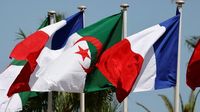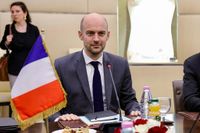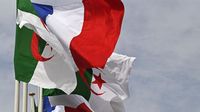In a significant escalation of diplomatic tensions, France has formally responded to Algeria's recent expulsion of twelve French diplomatic agents by announcing a reciprocal expulsion of twelve Algerian diplomats. This decision, confirmed by the Élysée on April 15, 2025, marks a sharp downturn in the bilateral relations that had briefly shown signs of improvement following a dialogue initiated in late March.
The French government expressed its "consternation" over Algeria's actions, describing the expulsion as unjustified and incomprehensible. In a statement, the Élysée noted that the Algerian authorities are responsible for a "brutal degradation" of the relations between the two nations. This latest diplomatic spat follows the arrest and subsequent detention of an Algerian consular agent in France, who is suspected of involvement in the kidnapping of an Algerian opposition influencer.
French President Emmanuel Macron has also recalled Stéphane Romatet, the French ambassador to Algeria, for consultations, further signaling the seriousness of the situation. The decision to expel the Algerian diplomats is described as a "symmetric" response to Algeria's prior actions, which had given the twelve French officials just 48 hours to leave the country.
Jean-Noël Barrot, France's Minister of Europe and Foreign Affairs, emphasized the importance of maintaining dialogue but insisted that it must not be one-sided. On social media platform X, he stated, "Dialogue, always, but not one-way," indicating that France will defend its interests vigorously. Barrot's remarks highlight a growing frustration within the French government regarding Algeria's recent diplomatic maneuvers.
Meanwhile, Bruno Retailleau, the French Minister of the Interior, expressed his strong disapproval of Algeria's actions, declaring it "inadmissible" for France to be a playground for Algerian services. His comments reflect a broader sentiment within the French government that is increasingly critical of Algeria's influence and actions on French soil.
The context for these tensions stems from the arrest of three Algerian nationals in France, including the consular agent, who were implicated in the alleged kidnapping of Amir Boukhors, a prominent figure opposing the Algerian regime. This incident has exacerbated existing strains in Franco-Algerian relations, which had already been fragile following Macron's acknowledgment of Morocco's sovereignty over Western Sahara.
Macron had previously engaged in a call with Algerian President Abdelmadjid Tebboune on March 31, 2025, aimed at reviving the strained diplomatic ties. Following this call, Barrot visited Algeria to discuss cooperation in various sectors, including security and migration. However, the recent expulsions have dashed hopes for a thaw in relations that had seemed possible just weeks earlier.
Political analysts note that the diplomatic back-and-forth is unprecedented since Algeria's independence in 1962, with such high-profile expulsions signaling a deepening rift. This escalation is reminiscent of past diplomatic crises, such as the tensions between France and Russia following the invasion of Ukraine in 2022.
As the situation unfolds, there are growing concerns about the implications for future cooperation between the two nations, particularly in areas critical to both countries, such as migration and security. The Élysée has made it clear that it will continue to demand that Algeria respect its obligations regarding national security and cooperation.
The repercussions of this diplomatic crisis extend beyond government relations, affecting private sector engagements as well. Recent reports indicate that several planned visits by French business leaders to Algeria have been canceled due to the heightened tensions. This includes the cancellation of a trip by Rodolphe Saadé, head of the shipping giant CMA-CGM, further illustrating the impact of the diplomatic fallout.
In light of these developments, the future of Franco-Algerian relations appears uncertain. As both nations navigate this turbulent period, the call for dialogue remains, but the path forward is fraught with challenges. The French government is now faced with balancing its diplomatic strategy while addressing domestic concerns over national security and the influence of foreign services on its territory.
While the immediate responses have been reciprocal expulsions, the broader implications of this diplomatic crisis could lead to a reevaluation of France's approach to its relationship with Algeria. The French government is keen to assert its interests while also recognizing the need for constructive engagement, even amid rising tensions.
Ultimately, as the situation continues to develop, both France and Algeria will need to navigate their complex history and current geopolitical realities to find a way back to a more stable and cooperative relationship.








